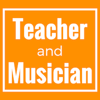Reading Highlights 9
This week’s reading roundup includes two posts that look at primary school music, one that advocates vocational qualifications for pupils considering the creative industries and one that looks at the pros and cons of removing tables from the music classroom.
Jackie Schneider: A review of my music teaching this year
Jackie’s first post of the summer holidays is a reflection on the last academic year. She, quite rightly, identifies that primary music coordinators experience the same isolation that John Atkinson highlighted for secondary music teachers in last week’s reading roundup. Just as John did, Jackie shows how she values online support to help combat this isolation.
It made me smile when I read the first thing on Jackie’s list of ‘things that went well’ – the lessons. Jackie believes that these lessons went well because “the children made music. Every week” – brilliant. The rest of the list reveals just how hard working Jackie is and the amazing opportunities that she provides for her pupils. This is genuinely inspirational reading.
Elizabeth Stafford: Some thoughts about First Access
My current work with Musical Futures: Just Play, which is an approach to music learning for generalist primary school teachers, has given me quite a keen interest in music making before children are eleven years old. As a result, Elizabeth’s discussion of First Access was a fascinating read. Her assertion that “schools and school-based staff” would be surprised if they were to hear that their involvement is key to the success of a First Access programme makes me more than a little sad and I wonder if this is a message that the entire music education community should start shouting about?
The Guardian: Picture yourself in the creative industries? Take a BTEC
One of the most enjoyable experiences of my career was when I was teaching BTECs. The learning that I saw taking place in my classroom wasn’t just measurable on the assessment decisions form, it was evident wherever you looked or listened. Those classes achieved so much and it really did feel like amazing preparation for a career in the creative industries. This Guardian article, aimed at students rather than teachers, was good to read at a time when many teachers I speak to are struggling to see the advantage of vocational qualifications.
Liz Glead: Life without tables – one year on
I do love to think about classroom layouts and Liz’s post shows the value of putting some thought into your teaching environment. I particularly like how she has noticed the positive impact on the entire performing/composing/listening trinity, rather than just focusing on the obvious benefits to performing. She acknowledges the difficulty of KS4/5 pupils being demotivated when they have to move furniture but, if my experience is anything to go by, then I imagine that she will see this as less of an issue as the years go by – the pupils who have experienced Key Stage 3 without tables will expect that to remain the case when they reach Key Stage 4.

